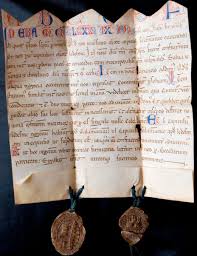记忆方法
记忆“indenture”的方法是创造一个故事场景或图像。可以想象一个人签下了一份“indenture”(通常指一种契约或合同),他的手指(ind)深深地(du)印在了纸张上,象征着契约的正式性和不可撤销性。这样的故事帮助将“indenture”的含义与它的词根和拼写联系起来,从而便于记忆。
以上内容由AI生成, 仅供参考和借鉴
中文词源
indenture 师徒契约
来自indent,咬合,-ure,名词后缀。因古代师徒契约写于两张锯齿状凹痕的契约纸上而得名。
英语词源
- indenture (n.)
- "contract for services," late 14c., from Anglo-French endenture, Old French endenteure "indentation," from endenter (see indent). Such contracts (especially between master craftsmen and apprentices) were written in full identical versions on a sheet of parchment, which was then cut apart in a zigzag, or "notched" line. Each party took one, and the genuineness of a document of indenture could be proved by juxtaposition with its counterpart. As a verb, 1650s, from the noun.
权威例句
- 1. She had to sign an indenture to sell herself, because she owed money to the landlord .
- 由于欠地主家的钱,她不得已签了卖身契。
- 2. To bind into the service of another by indenture.
- 以契约约束按契约的规定为另一方服务.
- 3. He is indenture to a builder.
- 他与一建筑工人订了师徒合同.
- 4. Xia zhi xing: please give his indenture and identity card back to him.
- 夏之星: 请你把天骐的卖身契跟身份证还给他.
- 5. Soon thereafter, private agents scoured the ports taverns, and countryside to sign on workers for indenture.
- 此后不久, 私人机构迅速搜查港口的小客栈和乡下地区,来招募契约仆役.
